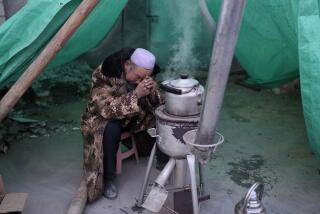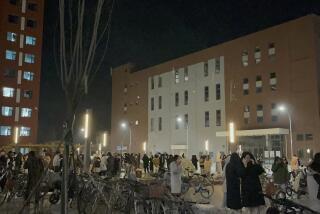‘Mama, save me, I can’t bear it’: A firefighter’s cry in China’s inferno
Just before 11 p.m. Wednesday, Liu Bin received an ominous notice: A logistics facility had caught fire, and his fire brigade, located a mere 650 feet from the site, was to put it out.
About an hour later, Liu’s mother received a call from an unfamiliar number, then heard her 26-year-old son’s voice.
“Mama, save me, I can’t bear it,” the firefighter told her, according to the Chinese Web portal NetEase. “My internal organs are frying.”
When she found him at TEDA Hospital, he was being treated for fractured ribs, an injured lung and internal bleeding -- but he was very much alive.
Liu was among the lucky ones. The two explosions that tore through the northeastern Chinese municipality of Tianjin late Wednesday -- shooting massive fireballs high above the port city’s skyscrapers -- killed at least 50 people, many of them emergency responders; hospitalized 701 with burns, cuts and other injuries; reduced buildings to mangled, windowless wrecks; and burned or smashed hundreds of cars, buses and trucks.
It was the latest in a string of large-scale industrial accidents, underscoring the cut corners and regulatory oversights that have emerged as a grim side effect of China’s breakneck economic ascent.
In the last year alone, China has been racked by six major chemical plant explosions, including blasts in Shandong, Jiangsu and Jiangxi provinces. In 2013, a pipeline explosion in the coastal city of Qingdao killed 62 people. That same year, a fire at a poultry plant in Jilin province killed 119; the factory’s doors were locked, preventing workers from fleeing.
See the most-read stories this hour >>
At least 17 firefighters were killed responding to Wednesday night’s inferno, according to state media, and dozens of people are still missing. The youngest of the fatally injured firefighters was 18 years old.
News reports said the logistics facility held containers packed with “hazardous materials.” The reasons for the blasts remain unclear.
The explosions rattled a large swath of Tianjin’s Binhai New Area, a newly constructed urban district that includes an industrial area, high-tech office parks, upscale apartments and a port on the Bohai Sea.
On Thursday night, thick smoke still billowed from the site of the blasts. At least five mid-rise buildings appeared to have been completely destroyed. The air carried an acrid scent like that of fireworks.
“I thought it was another 9/11,” said George Cai, a native of nearby Hebei province living about two miles from the site who came to survey the damage. Like many other curiosity seekers, he was able to get within about 1,000 feet of the site. “It was like something out of a Hollywood action movie, like Godzilla.”
Near the logistics center, towers of mangled shipping containers teetered precariously as onlookers snapped selfies amid the burned-out rubble.
Even businesses more than a mile away -- a McDonald’s, a Ford dealership, offices inhabited by Foxconn, Hewlett-Packard and Standard Chartered -- were seriously damaged in the explosions, their edifices twisted and their windows smashed. At a ruined fire station, the slogan “Listen to the party” glared from a shattered facade.
NEWSLETTER: Get the day’s top headlines from Times Editor Davan Maharaj >>
President Xi Jinping and Premier Li Keqiang both urged “all-out efforts” to save the injured and contain the fire ignited by the blasts.
Local authorities dispatched 1,000 firefighters, 151 firetrucks and a drone, fire official Zhou Tian said at a Thursday news conference. They evacuated three real estate developments and opened relief centers at 10 schools, added Zhang Yong, the Binhai New Area’s district chief.
The injured were being treated at 10 hospitals, he said. Hundreds of people lined up to donate blood.
Experts set up several air quality monitors to check for toxins and, according to official pronouncements, declared the air safe to breathe.
Yet at the scene, the rescue effort seemed beset by confusion. Police warned journalists near the site that the air was dangerous. But officers wore only flimsy surgical masks, and a crew of street cleaners oddly dispatched to sweep the elevated highway had no protection.
It was unclear whether firefighters realized initially that they were facing a chemical fire, not a simple structure fire.
Dozens of volunteers stood outside a primary school distributing masks, snacks and water.
“We were supposed to help out in two shifts,” said one, an employee of the American company Amway who had been there for hours. “But we just heard the fire was still on, and it’s not safe to be here any longer. The night shift people won’t come.”
After such large-scale disasters, the Chinese authorities tend to follow a familiar pattern: They keep reporters away, delete criticism on social media sites and flood state-run media with praise for the government’s relief efforts. But it is becoming harder to suppress bad news.
In 2011, a high-speed train crash that killed 39 people near the eastern city of Wenzhou turned into a public relations debacle when official propaganda directives were leaked online. They urged journalists to refrain from investigative reporting and only do “stories that are extremely moving,” such as volunteers donating blood.
In June, when nearly 400 people were killed when a cruise ship capsized on the Yangtze river, authorities warned relatives of the deceased not to speak with foreign media.
“I can’t rule out that even among Chinese journalists there are people who want to smear the government,” the city of Nanjing’s deputy police chief, Hu Shining, told them, according to the Reuters news agency.
In the absence of information, rumors proliferate. On Thursday, many Internet users voiced concern that the explosions had contaminated Tianjin’s air and that the noxious cloud could blow over to Beijing. Some wondered why a company was allowed to store dangerous chemicals so close to residential areas; others castigated the local broadcaster, Tianjin TV, for showing cartoons as the disaster unfolded, apparently because it was awaiting high-level permission to cover the news.
When a reporter pressed Tianjin’s Environmental Protection Bureau chief Wen Wurui about the storage facility’s proximity to residential homes during a live news conference Thursday afternoon — and he visibly struggled to reply — the station cut away to a concert.
That night, hundreds of people milled about on the street about two miles from the blast site; some said that their homes had been damaged and that they had nowhere to go.
Cellphone videos of the explosions -- and images captured by a Japanese weather satellite and shared on social media -- showed the skyline of gleaming high-rises silhouetted by the eruption of flame and smoke. State-run China Central Television said the two explosions had the force of 3 tons and 21 tons of TNT, enough to shatter windows and knock observers to the ground.
“Last night I was completely in shock,” said a security guard at a residential building who gave his surname as Li. “Everyone ran out as quickly as they could.”
The explosions happened around 11:30 p.m. Wednesday at the Tianjin Dongjiang Port Ruihai International Logistics Co., which handles the shipping and transportation of hazardous materials, the Tianjin Public Security Bureau said.
According to the company’s website, the facility covers about half a million square feet and includes several hazardous and dangerous goods warehouses. The company, which was founded in 2011, has about 70 full-time employees and handles a million tons of cargo a year, it says.
The chemicals stored there include sodium cyanide, toluene diisocyanate and calcium carbide, all of which can be harmful to humans, according to the Tianjin Fire Department.
“Sodium cyanide is highly toxic whilst toluene diisocyanate and calcium carbide react violently with water – a further potential hazard with rain forecast for the region over the next 24 hours,” the environmental group Greenpeace warned in a statement. “The rain also raises the risk of chemicals being washed into local water supplies and eco-systems – with unknown impacts.”
Local authorities appear to have been sensitive to the risks of storing such chemicals. In March last year, Tianjin port authorities required the company to conduct a drill on how to deal with a chemical leak and other potential emergencies, according to a post on the firm’s website that was later deleted.
The State Administration of Work Safety had not yet determined the cause of the explosions “because the fire at the scene has not been completely put out,” the official New China News Agency reported.
The forecast Friday called for rain.
Makinen reported from Tianjin and Kaiman from Beijing. Tommy Yang and Nicole Liu in The Times’ Beijing bureau contributed to this report.
Follow @JulieMakLAT and @JRKaiman for news from China
ALSO:
Tibetans lose a haven in Nepal under Chinese pressure
Q&A: Why China’s devaluation of the yuan matters so much
China claims human rights lawyers were part of ‘criminal syndicate’
More to Read
Start your day right
Sign up for Essential California for news, features and recommendations from the L.A. Times and beyond in your inbox six days a week.
You may occasionally receive promotional content from the Los Angeles Times.







